This concept is usually divided into two categories: internal and external. If a person has an internal locus of control, that person attributes success to his or her own efforts and abilities. A person who expects to succeed will be more motivated and more likely to learn. A person with an external locus of control, who attributes his or her success to luck or fate, will be less likely to make the effort needed to learn. People with an external locus of control are also more likely to experience anxiety since they believe that they are not in control of their lives. This is not to say, however, that an internal locus of control is “good” and an external locus of control is “bad.” There are other variables to be considered, however, psychological research has found that people with a more internal locus of control seem to be better off, e.g. they tend to be more achievement oriented and get better paying jobs.
For several years, I taught a course for mental health professionals who were interested in developing a private practice in psychotherapy. Some, who already had a practice, took the course because they were not doing well and wanted to learn how to be more successful. During the introductory remarks by each student, I was able to mentally divide the class into those having an internal or external locus of control and, therefore, learn a great deal about the class composition. The “internals” said things like, “I know it’s up to me,” “I have to learn how to become more successful,” “I am responsible for what happens in my practice,” etc. (Notice the word beginning each statement). The “externals” were heard to say things like, “it’s too hard to succeed these days,” or “the competition in our field is killing me,” etc. The internals clearly believed that it was, essentially, up to them to succeed. The externals believed that luck, fate, or circumstance would more likely determine whether or not they would or would not become successful, more than the strength and quality of their own efforts.
Locus of control is often viewed as an inborn personality component. However, there is also evidence that it is shaped by childhood experiences – including children’s interactions with their parents. Children who were raised by parents who encouraged their independence and helped them to learn the connection between actions and their consequences tended to have a more well developed internal locus of control.
The benefits of this were specified in a recently published research study that looked at the potential health effects of the locus of control trait. Researchers found that of more than 7,500 British adults followed since birth, those who had shown an internal locus of control at the age of 10 were less likely to be overweight at age 30, less likely to describe their health as poor, or show high levels of psychological stress. The major explanation for these findings was that children with a more internal locus of control behave more healthily as adults because they have greater confidence in their ability to influence outcomes through their own actions. They may also have higher self-esteem.
